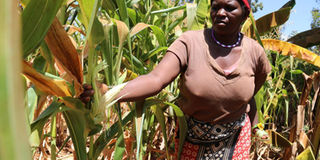It’s time corporates save Kenyans from curse of failed rains

In a country such as ours, largely dependent on rain-fed agriculture, any news of impending failure of the rains is a cause for concern. It, therefore, falls upon big businesses to ensure environmental conditions are kept optimum, to ensure adverse climate change effects are minimised. FILE PHOTO | NATION MEDIA GROUP
What you need to know:
- A healthy population provides a good market for goods and services produced in the country.
- With farming households earning less, there would be a reduction in disposable income and inability to afford basic needs.
- The connection between business and climate makes a strong case for big business to take a lead in ensuring our environment is protected.
- Sustainability is no longer a CSR issue but has become a major environmental issue requiring serious consideration by corporates.
A seasonal forecast issued by the Kenya Meteorological Department recently noted that most parts of the country would experience depressed rainfall, with the exception of a few areas which were noted would get below normal to normal rainfall.
In a country largely dependent on rain-fed agriculture, any news of impending failure of the rains should be cause for concern, especially in light of the fact that agriculture contributes about 30 per cent of the gross domestic product.
It is now clear that the rains have failed altogether and that productivity from agriculture is suffering. Agricultural producers are already reporting major declines in production, while the media has been carrying stories of communities ravaged by drought.
We are in a major socio-economic crisis as a result. Farmers who last year earned record incomes on the back of favourable weather and good commodity prices should brace themselves for a dip in earnings.
For instance, tea farmers affiliated to Kenya Tea Development Agency Management Services (KTDA-MS), who last year earned Sh84 billion from the sale of tea should expect to be hit hard, with the reality of declined production of up to 20 per cent so far.
Economists at the Treasury are probably now revising downwards their growth projections as a result of the failed rains and the resultant negative effects on the economy.
With farming households earning less, there would be a reduction in disposable income and inability to afford basic needs.
Scale the scenario to the millions of farming households in the country then it becomes a major socio-economic crisis.
Failure of the rain is majorly a result of human activity. Destruction of the forest cover in water catchment areas reduces the supply of water necessary for farming to thrive.
DISAPPEARING FORESTS
Driving through the western countryside of Kenya recently, I noticed the canopies of the famous Kakamega Forest are fast disappearing.
Inside the forest, I encountered tractors carrying felled trees presumably from the forest itself.
The forest cover on the Mau escarpment is slowly being replaced by dry brown patches of farmland ready to be tilled, and which are visible from the road as you drive past Molo towards Kericho.
In my village, swathes of land that were not so long ago covered by indigenous forests are now bare.
In short, green Kenya is quickly disappearing.
The restoration of our water towers has to be done as a matter of urgency to return the ecosystem to its original state, and with the government working with limited resources to comprehensively undertake reforestation activities, corporate Kenya, with its vast resources, must be compelled to take up this responsibility.
This is the group that has invested heavily in Kenya and which depends on the people of Kenya to provide the raw materials, human resource and markets for the goods and services produced.
The connection between business and climate makes a strong case for big business to take a lead in ensuring our environment is protected.
Natural resources like forests, water and fuel, which are primary inputs for many large businesses, are finite. To survive, big business must show concern for how the country is taking care of these natural resources.
With the country still heavily dependent on hydropower energy, scarcity of water means higher energy costs for business.
It, therefore, falls upon big businesses to ensure environmental conditions are kept optimum for business to thrive.
Further, a healthy population provides a good market for goods and services produced within the country. It makes little business sense for producers to serve a market that is unable to obtain neither food nor water.
PLANT MORE TREES
It all must begin by ensuring the country has its basic needs.
Environmental conservation by businesses has to go beyond compliance with environmental legislation and token CSR actions of planting a few trees during national tree planting days.
It has now become an expectation that big business demonstrate the environmental sustainability of their activities before engaging the markets.
Sustainability is no longer a CSR issue but has become a major environmental issue requiring serious consideration by corporates.
It is worthy to note that corporates can establish tree nurseries to supply seedlings to farmers, aside from acquiring land to plant forests.
KTDA, for instance, is involved in the restoration of the Mau Forest, in partnership with other corporate players in the agricultural sector. But that’s not enough. More corporates must come in and save the forests.
The future of corporate Kenya will be determined by those companies that care about their environmental footprint and invest in making our environment better.
The rains will continue to fail because we continue to ignore the fact that we are destroying our environment.
It’s time for corporate Kenya to change that and make it rain again.
The writer works in the agriculture sector.
***
Drought
- Current drought follows a poor 2016 long rains season, so it could turn out to be worse.
- Close to two million people are facing food and water shortage.
- 12 counties (up from 8 in December 2016) are now in the alarm drought phase, a step from a crisis.




